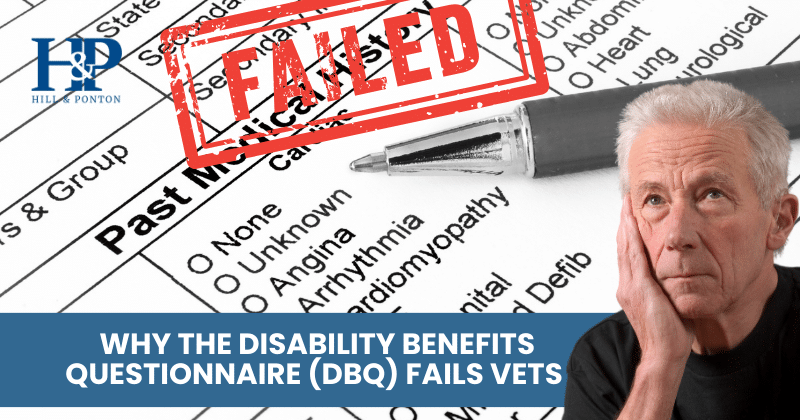The process of securing disability benefits from the Department of Veterans Affairs (VA) is a critical yet often challenging journey for many veterans.
One tool at the center of this process is the Disability Benefits Questionnaire, commonly known as the DBQ.
This form is designed to evaluate your medical condition and help determine your eligibility for benefits.
However, what should be a straightforward process is marred by ongoing issues that can make it difficult, if not frustrating, for veterans like you to get the benefits you rightfully deserve.
In this article, we will delve into the purpose behind the DBQ, how it’s supposed to streamline the process of obtaining disability benefits, and, importantly, the persistent problems that affect its efficiency and fairness.
From lack of transparency to accessibility issues and inconsistencies, we’ll explore why the DBQ system may not be serving veterans as well as it should.
We will also provide real-life cases, statistics, and actionable advice for navigating these obstacles.
Our aim is to inform you about these problems and offer guidance on what you can do to overcome them.
Whether you’re beginning the disability application process or facing complications, understanding these issues can equip you with the knowledge to better advocate for yourself.
What is the Disability Benefits Questionnaire (DBQ)?
The Purpose Behind the DBQ
The Disability Benefits Questionnaire, or DBQ, is an essential document created by the Department of Veterans Affairs.
Its main purpose is to streamline the disability benefits process for veterans.
The VA designed this form with the hope of making it easier for medical providers—whether they work directly for the VA or are private healthcare practitioners—to evaluate and document the medical conditions of veterans.
By using a standard form, the VA aims to make the process of determining disability benefits more consistent and efficient.
How It’s Supposed to Work
The process starts when you, the veteran, apply for disability benefits through the VA.
Upon receiving your application, the VA may direct you to undergo one or more medical evaluations to assess your condition.
You might complete a DBQ with a VA healthcare provider or a private doctor who is familiar with the form.
After your medical evaluations are complete, the VA takes the information from the DBQs and combines it with other evidence, such as your military medical records, to make a decision about your disability rating.
This rating will determine what benefits you’re eligible to receive, ranging from healthcare to monthly payments.
In theory, the DBQ is intended to make the process straightforward.
The standardized questions should help medical providers quickly understand your condition, and the form itself should simplify the VA’s task of determining your eligibility for benefits.
However, despite these intentions, a number of persistent issues hinder its effectiveness, as we will explore in the next section.
This basic overview of the DBQ may make it seem like a helpful, if not essential, tool in the process of obtaining your VA disability benefits.
But as many veterans have found, the reality is often far more complicated.
Keep reading to discover what these complications are and how they may be affecting your ability to secure the benefits you’ve earned through your service.
The Persistent Problems With the DBQ System
Navigating the labyrinth of VA disability benefits is tough enough.
The Disability Benefits Questionnaire (DBQ) should theoretically make things easier.
However, it comes with its own set of challenges that can add more hurdles to an already complicated journey.
Here’s a deeper look at the persistent problems veterans face with the DBQ system.
Lack of Transparency
When you’re filling out a DBQ, the guidelines provided can often be unclear or vague.
You may find that the questions are not directly related to your condition, or worse, that they are open to interpretation.
This lack of clarity can lead to incomplete or inconsistent information, which in turn may cause unexplained rejections or delays in your disability benefits.
Accessibility Issues
For many veterans, even finding a qualified medical provider to fill out a DBQ can be a daunting task.
Some VA facilities might not offer easy access to these forms, and private healthcare providers may not always be familiar with them.
Moreover, the forms themselves are often outdated, which can cause further confusion and delays.
Inconsistency and Errors
Perhaps one of the most frustrating issues with the DBQ system is the inconsistency in evaluations.
Two veterans with similar conditions may end up with vastly different disability ratings due to variations in how their DBQs were filled out or evaluated.
Errors in the forms, whether from the healthcare provider or from the VA’s evaluation process, can lead to unjust denials or lower-than-deserved disability ratings.
Such mistakes can be devastating, often requiring time-consuming appeals and causing financial hardship.
These ongoing issues with the Disability Benefits Questionnaire system do more than create paperwork headaches; they affect the lives of veterans who are seeking the benefits they earned through their service.
The next section will give voice to real-life stories from veterans and present the statistics that underscore the depth of these problems.
Real-Life Cases of DBQ Complications
Understanding the systemic issues with the Disability Benefits Questionnaire (DBQ) system is one thing, but hearing the real-life experiences of fellow veterans brings these problems into sharp focus.
Let’s delve into personal accounts and data that showcase the complexity and challenges of the DBQ process.
Veterans Speak Out
Many veterans have come forward with their stories about navigating the tangled web of the DBQ system.
For instance, John, a Navy veteran, faced a series of rejections despite having clear medical evidence of his disability.
His experience highlights the lack of transparency, as he was left confused by the VA’s vague reasons for denial.
Similarly, Sarah, an Army veteran, struggled to find a qualified healthcare provider who was familiar with the DBQ.
Her story draws attention to the significant accessibility issues that veterans can encounter when trying to obtain the necessary evaluations for their disability claims.
These are not isolated incidents.
Countless veterans have faced challenges that range from administrative errors to outright denials, all due to complications arising from the DBQ system.
Statistics Don’t Lie
The personal stories are compelling, but they are further reinforced by hard data.
According to recent statistics:
- A significant percentage of veterans have faced delays in the processing of their disability claims, often due to issues related to DBQs.
- A notable number of claims are sent back for re-evaluation, adding to the stress and financial burden on veterans.
- Appeals related to DBQ errors or inconsistencies are alarmingly common, suggesting that the system is far from foolproof.
The real-life cases and data make it abundantly clear that the DBQ system has flaws that need urgent attention.
Next, we’ll discuss what the VA is doing—or not doing—to address these critical issues.
This will help you understand the gap between the VA’s promises and the realities that veterans like you face every day.
What the VA is Doing About It
Given the widespread issues surrounding the Disability Benefits Questionnaire (DBQ) system, one would hope that the Department of Veterans Affairs (VA) is taking significant steps to address these challenges.
However, the actions taken thus far present a mixed bag of attempts at solutions and shortcomings.
Official Responses
The VA has acknowledged some of the issues related to the DBQ system, albeit not as comprehensively as many veterans would like.
In their official statements, the VA has mentioned initiatives to update the DBQ forms, provide clearer guidelines, and offer training to healthcare providers for a more standardized evaluation process.
Shortcomings of VA Solutions
While these efforts seem promising on paper, they often fall short in practice.
For instance, despite pledges to update the DBQ forms, many veterans still report using outdated forms that do not reflect the nuances of their medical conditions.
Training programs for healthcare providers are being rolled out, but not quickly enough to make an immediate impact on the evaluations veterans receive.
Moreover, there is a considerable gap between the VA’s official statements and the experiences of veterans.
Many still find themselves grappling with the same issues—lack of transparency, accessibility problems, and inconsistencies—that the VA claims to be resolving.
It’s crucial to note that while the VA is making some attempts to improve the system, these efforts are not yet sufficient to address the broad and deep-rooted issues with the DBQ process.
The following section will provide you with actionable advice on what you can do to navigate this flawed system more effectively.
Whether you’re in the beginning stages of applying for disability benefits or are caught in a cycle of appeals, the next section aims to equip you with the knowledge and resources you need.
It’s crucial to note that while the VA is making some attempts to improve the system, these efforts are not yet sufficient to address the broad and deep-rooted issues with the DBQ process.
The following section will provide you with actionable advice on what you can do to navigate this flawed system more effectively.
Whether you’re in the beginning stages of applying for disability benefits or are caught in a cycle of appeals, the next section aims to equip you with the knowledge and resources you need.
What Veterans Can Do
As you navigate the complex landscape of the VA disability benefits system, it’s essential to be proactive.
While we wait for systemic changes that may or may not come, there are several steps you can take to safeguard your rights and improve your chances of a favorable outcome.
Here’s some advice tailored to help you deal with the persistent issues plaguing the Disability Benefits Questionnaire (DBQ) system.
Protecting Your Rights
Given the lack of transparency and high rates of error in the DBQ system, it is vital to be meticulous in your application process:
- Document Everything: Keep copies of all paperwork, correspondence, and medical records. This can prove invaluable if you need to appeal a decision.
- Consult a Specialist: If possible, consult a healthcare provider who specializes in your particular condition and is familiar with the DBQ process.
- Get Legal Advice: Many veterans have found it beneficial to consult legal experts familiar with VA disability claims. They can guide you through the complicated appeal process if necessary.
Speaking Up
Don’t suffer in silence. If you encounter issues, it’s crucial to speak up:
- File a Complaint: If you experience problems with the DBQ or your healthcare provider, you can file a complaint with the VA.
- Initiate an Appeal: If your claim is denied or you receive a lower disability rating than you deserve, initiate an appeal. Appeals can be a long process but are often the only way to secure the benefits you deserve.
- Use Resources for Advocacy: There are numerous non-profit organizations and advocacy groups designed to assist veterans. They can help you understand your rights and guide you through the DBQ process.
The Disability Benefits Questionnaire (DBQ) was designed to be a tool that simplifies and streamlines the VA disability benefits process for veterans.
However, as we’ve discussed, it comes with a host of challenges, from a lack of transparency and accessibility issues to inconsistencies and errors that can significantly impact your claim.
While the VA has taken some steps to address these issues, much more needs to be done to make the system fair and efficient for all veterans.
In the meantime, being proactive, well-informed, and prepared can go a long way in helping you navigate this complex process.
Document everything, consult experts when possible, and don’t hesitate to speak up or appeal when you face difficulties.
Your service to your country has earned you the right to fair and accessible disability benefits, and it’s crucial to advocate for yourself to ensure you receive them.
The challenges with the DBQ system are more than bureaucratic hurdles; they are barriers that can profoundly impact your life and well-being.
0It’s a system that needs immediate reform, and while we wait for that change, arming yourself with knowledge and taking actionable steps is the best way to advocate for the benefits you deserve.
Have Questions About Appealing Your Claim or Understanding How the Claims Process Works?
The attorneys at Hill & Ponton are here to support you with appealing a claim to get benefits.
If you are intending to appeal a denied VA disability claim, you can contact us for an evaluation and we can help you with this process.
However, if you are considering filing an initial claim, or even if you are interested in learning about the appeals process, we offer a free ebook to get you started on the right foot!
The Road to VA Compensation Benefits will help break down the claims process from start to finish. Click the link below to learn more.




